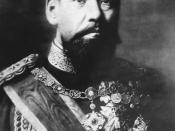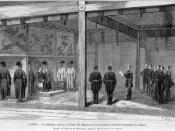In 1945 Prime Minister Yoshida Shigeru was told by General Douglas MacArther that postwar reforms were necessary to eliminate the growing malady that had formed after the Meiji period. When the Meiji emperor was restored as head of Japan in 1868, the nation was a militarily weak country, was primarily agricultural, and had little technological development. It was controlled by hundreds of semi-independent daimyo. The Western powers, Europe and the United States, had forced Japan to sign treaties that limited control over its own foreign trade and required that crimes concerning foreigners in Japan be tried not in Japanese but in Western courts. When the Meiji period ended with the death of the emperor in 1912 Japan had succeeded in becoming a fully industrialized society and its economy rivaled that of the western powers. It had regained complete control of its highly centralized, bureaucratic government and by fighting and winning two wars (one of them against a major European power, Russia) it had established full independence and equality in international affairs.
In a little more than a generation, Japan had succeeded in attaining its goals, and in the process, had changed its whole society. Just as Yoshida had believed, Japan did not need a total reformation in order to progress into the future.
The abolition of feudalism made possible tremendous industrial and economic changes. Millions of people were suddenly free to choose their occupation and move about without restrictions. In order to transform the agrarian economy of Tokugawa Japan into a rapidly growing industrial sector, many Japanese scholars were sent abroad to study Western science and languages. The government led the way in the transportation and communication networks, building railway and shipping lines, telegraph and telephone systems, three shipyards, ten mines, five munitions works, and fifty-three consumer industries (making...


